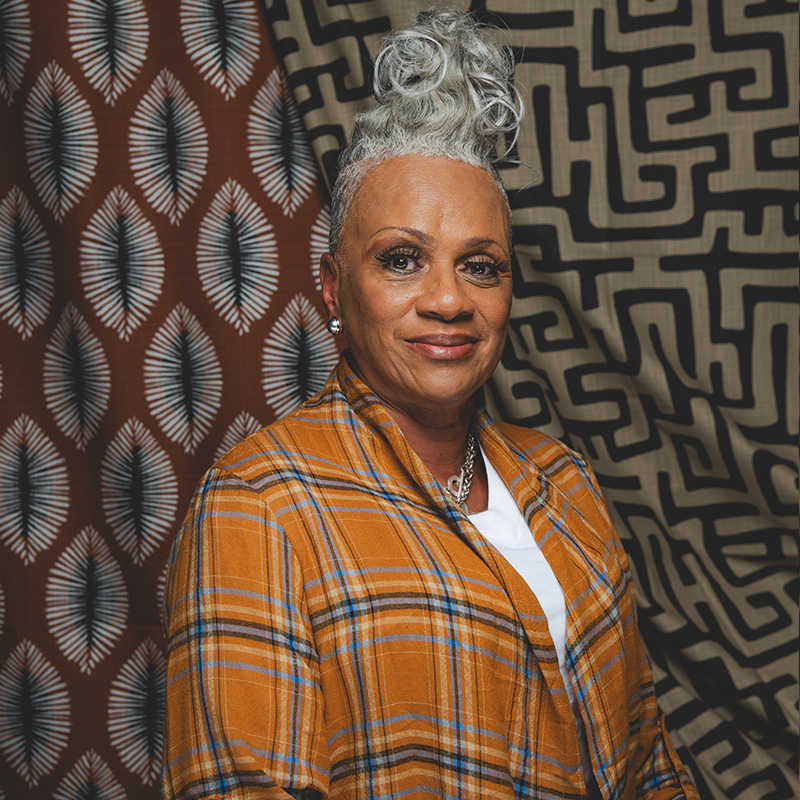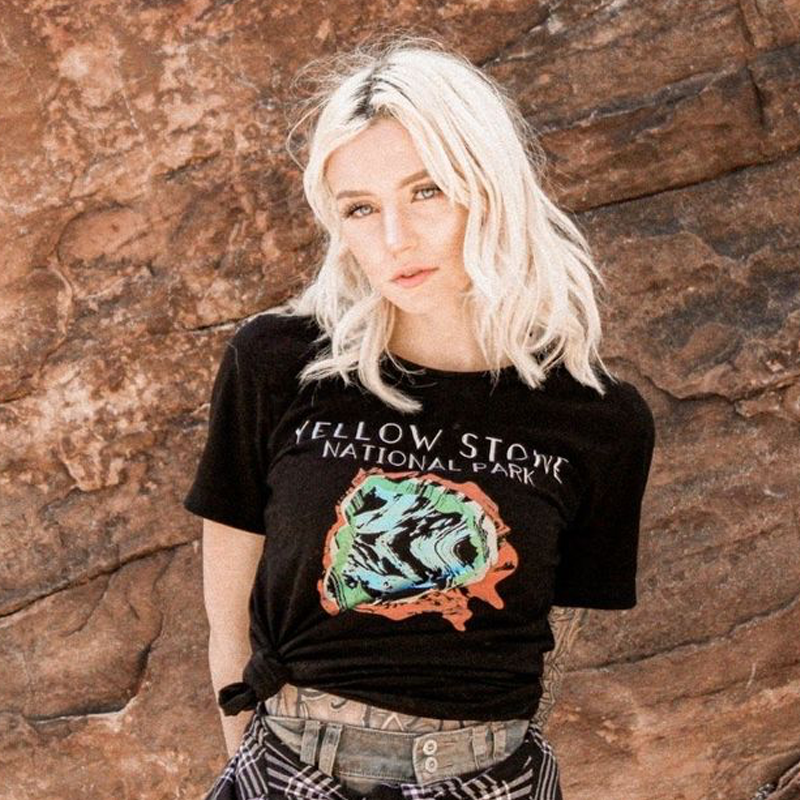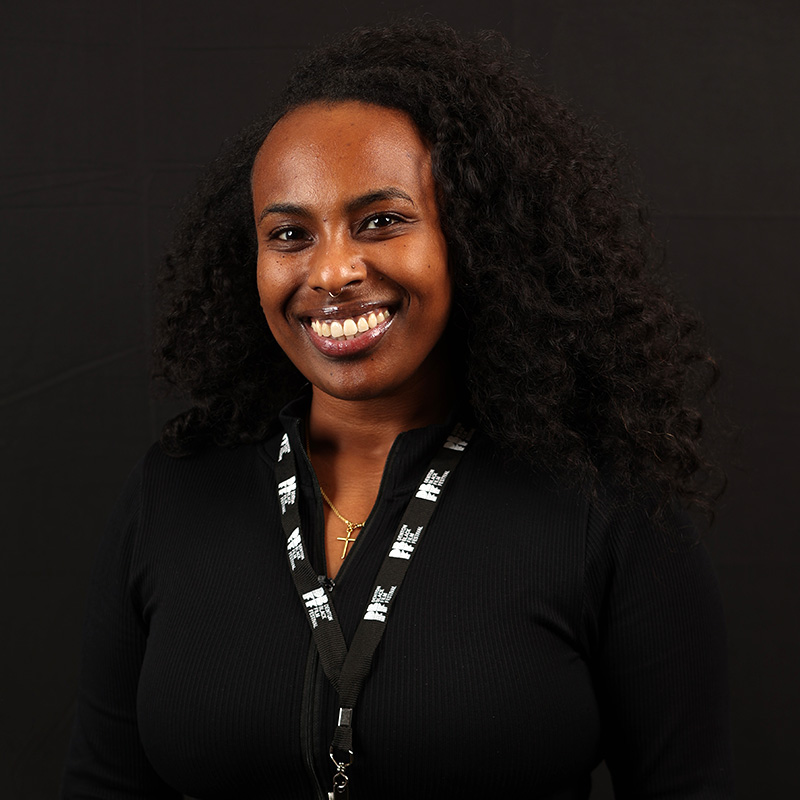
Jackie Toomer
"I was self employed. But I lost my home to a predatory lender. So I lost my business. And I went down to zero."
Jackie Toomer
Ashby Combahee
Alright, well my name is Ashbee Combahee and I am here with Dartricia Rollins. And we are interviewing Jacqueline Toomer.
Jacqueline Toomer
Yes, ma’am.
Ashby Combahee
Yeah. For the Telling Our Own Stories: Black Women’s Leadership Legacies event. Today is September 23rd, 2023. And Georgia Dusk: a southern liberation oral history is conducting this oral history at the 7 Stages Theatre in Little Five Points neighborhood of Atlanta. You have been asked to participate in this story telling project. One moment, excuse me, we are starting to record can we be a little quieter? Thank you. You’ve been asked to participate in the storytelling project to uplift the stories of Black women and their lineage of radical leadership as part of the film screening of Storming Caesar’s Palace. Storming Caesar’s Palace uplifts the story of a band of ordinary Black women or Black mothers excuse me, who launched one of the most extraordinary, yet forgotten feminist anti poverty movements in US history, providing a blueprint today for an equitable future. So this oral history collection is in partnership with The GRO Fund, filmmaker Hazel Gurland-Pooler, Red Owl Partners, Tender Foundation, Black Feminist Futures, us at Georgia Dusk, and the Center for Civic Innovation Atlanta, Represent Georgia, and WRFG Atlanta. So after that whole introduction Auntie Jackie, can you please introduce yourself by saying your name, pronouns, and age?
Jacqueline Toomer
Pronouns, and what?
Ashby Combahee
Age
Jacqueline Toomer
H?
Ashby Combahee
Yes.
Jacqueline Toomer
Say H to my name.
Ashby Combahee
Yes.
Jacqueline Toomer
Ashby Combahee
No, age.
Jacqueline Toomer
Oh, okay. First, my age, or my name?
Ashby Combahee
First your name.
Jacqueline Toomer
Okay. My name is Jacqueline Toomer. I’m 63 years of age.
Ashby Combahee
So, one thing that we like to ask people to do when they first start their oral history is, who would you like to dedicate this oral history to?
Jacqueline Toomer
Dr. Juanita Bynum.
Ashby Combahee
Tell us more.
Jacqueline Toomer
I had, lost my home. My son was attending Morehouse. So with my losing my home, see I had, my vehicle had been repoed. So my dad gave me his vehicle. So I had lost, I was self employed. But I lost my home to a predatory lender. So I lost my business. And I went down to zero. And my son was attending Morehouse College, but at that time, he stayed on campus. So I knew that I could sacrifice to go and find a job somewhere. And one of my church members referred me to the airport. And she said, Well, auntie, they don’t pay me 7.25 an hour. And I told her, I said, it’s okay. So, I needed to work three weeks at 7.25, to be able to get an apartment to get the money for the apartment. So I slept in my vehicle on Virginia Avenue at the Hilton Garden Hilton Hotel. I would park there every night, and catch a shuttle to the airport. And to make the money to get an apartment. And so after three weeks of working at the airport, late one night, Dr. Bynum. She didn’t know who I was, and I didn’t know that, who she was at the time. They dispatch and say, well, you have one person that you need to take to A concourse and I was telling her I said, Ma’am, I got to get back. It was late at night. And we out, she say, you the only person have to take this lady to her destination. And so I say, Ma’am, my feet swollen, you the only person. Okay. Still, you know, with my presentation of good customer service skills and hurting in the inside, trying to make it back to the airport to catch the train. I was going through the airport escorting her. And then she began I guess just to look at my outward appearance, like most people, and she said, ma’am, what are you doing out here at this time of night, working at the airport, pushing wheel chairs, you don’t have any business being out here this time of night. So you know, I said Yes, ma’am. I say Oh, you just have to sometime do what you have to do, you know. So as I began to push her, she said, can I ask you how much you make an hour and I said 7.25 and hurting on the inside and these questions, but continue to, you know, exhibit good customer service, providing the question she was asked me with the situation I was in. She say, Well, how do you make it off 7.25 an hour. And I just immediately told her that God took a little boy’s lunch, and he held it up and he blessed it. And I trust God with little. He fed 5000 and 7.25. Lord, I trust you. And she took herself, turn around and asked me that I know who she was talking to. And I told her no, ma’am. So at that time, I began to, you know, fall down and, and just really boohoo because she said, Well, I’m Dr. Juanita Bynum. But I guess with my, I guess, you know, energy, she could just sense. And so I was able to just tell her, I never went to tell her that I was sleeping in my vehicle. But I told her I was in the process of writing a book, which is Two Fish and Five Loaves that I have right now in label, you know, just trying to get some, and the book will be dedicated to her, because I was already going through a tough time. So as we began to talk, and I shared some things with her about her losing things and how, you know, she was on food stamp and how God made a way for her. She was inspired, in my telling her that simple things with great impact that Jesus did. That was a simple task. And it don’t take a whole lot. It’s the simple things and belief. And to be able to speak those things into existence. You know, what I’m saying, and Lord, I trust you. If you did it with the Two Fish, Five Loaves, I trust you with 7.25. And even in the midst of sleeping in my vehicle for two weeks at the hotel, the manager began to monitor the camera at night. So one night, it was a bad storm, he came out. And he said, Ma’am, every night I see you pull up here in the vehicle. It’s storming and thundering out here tonight. You can’t stay out here like this night, I’m not going to let you stay out here tonight. I have, somebody canceled, and they paid for the room and he had a open reservation that I could stay there for a week. So two weeks, I slept in the car and the next week in the hotel, and then I was able with this 7.25 an hour to accumulate the 300 and something I need for a deposit for an apartment. So it’s just been a divine bliss and see, we we make our plans, but God order steps. At that night at that time, I was in a hurry to get back to the train. And really was just trying to really refuse even getting this person but when you be obedient to you know, God’s divine purpose in our life and plan, then you just you act upon it. So in my obedience and everything. During that process, after Dr. Bynum got on the plane, and we shared some things, I told that’s my book Two Fish, Five Loaves. And so she said, oh, this’ll start your book. I never looked at the money, I just put it in my pocket. So when I got on the train and began to count my tips, it was 250, which is Two Fish and Five Loaves for the book. And, and, you know, it’s just been, you know, one day at a time and trying to tap into different avenues of trying to get help. But a lot of times people look at your outward appearance. So my outward appearance, I don’t look like what I’ve been through, or what I’m going through. And I’ve learnt to be grateful, I dress from the thrift store. So a lot of times people look at my outward and they don’t they don’t give you anything. And when I heard about the In Hands program, it was the last day, it was the last day. And I was really going through trying to pay my rent. And so the lady saw my sister was saying somebody had told her, she said but I think the program has already ended. But I was obedient again, I just called over to City Hall. And she said No, ma’am, you got until four o’clock. Todayis the last day but you got til four o’clock to apply. So she gave me the information because all the women wouldn’t even share information. And we all going through something you know in society, and you know, we don’t value integrity anymore, more than trying to help somebody else. And when you make things happen for people, God opened doors for you, but people were looking at the outward. So all my life I’ve gone through the rejection, you know. Rejection, so I’ll say this program, same thing. You know well, let me just try anyway, the last day, and when I put the information in and gave them all they needed, and they came back with the response, I was just so overwhelmed because I’ve always been rejected. Always even in serving in ministry in the church, to serve, and do well and people look at your outward. When I actually dress from the thrift store, that’s my happy place to go every week, and pickup. My mom said before she died, I don’t care what you go through in life, always fix yourself up and know nobody’ll never know it. So I always wear the little pearls, I would use you know the little pearls because pearls represent power, and strength. And I just fixed myself up, but because of that, I’m rejected. And people don’t know until you tell them, you know. So, you don’t have to look like what you’re going through. And people need to realize that, that we’re all dealing with either we’re in a situation going through or coming out. But if you can be a blessing. If you have information to share with other women that’s in a situation, opposed to looking their outward appearance, sow it to them, because that’s the god and heartly thing to do, to not be selfish with it. And that’s what society now you know what I’m saying they have information. And they won’t tell people that don’t look like they’re going through nothing. But sometimes that can be a test, God can test in those situations to you to know funding, or you can have information to help somebody, and then you don’t share it. So Helping Hands has really been, a blessing to me. They didn’t, I wasn’t rejected. Even though in my mind, I kept saying, oh, you know, but it was a genuine blessing. And I really I’m grateful. And I really appreciate the program for what it stands for. And when it says In Hands, in God’s hand, he got me and the program itself to represent In Her Hands, is just the significance of it. You know what I’m saying? In the bosom of Jesus, I gotcha. And so it’s just have been a divine blessing the staff have the customer service have been excellent. And each, the money is always there. And I’m able to pay my rent. And look ahead for the next purpose of whatever God desire for me to be using the word to let somebody else know, you don’t have to look like what you’re going through. So, but I appreciate In Her Hands, for sowing the seed of the funding to help me and that that program will be a blessing to a lot of women from the North, South and East and the West. They didn’t look at my outward appearance, you know, and it’s been a blessing.
Ashby Combahee
Thank you so much for sharing this story. And for, yeah, speaking on how it’s touched on you touched your life and changed your life. I appreciate it. I had a few other questions, but you answered all of them. And that story is a beautiful story. Yes. So thank you. Before we stop recording, is there anything else that you want to share and make sure it’s included in this recording?
Jacqueline Toomer
No, just you know, God is good and we have to be obedient in this season. To opportunities that people put forth, you know, with a lot of Black, Afro American women to help us because you know, you know the outward appearance look at people look at and don’t judge that, you know, the heart in In Hands having to hold me.
Ashby Combahee
Thank you.
EXPLORE MORE STORIES
Stephanie Moore

Lindsay Cassella

Shalom Gibtsawi

